DNUR 135: Critical Analysis of Contemporary Issues in Nursing
VerifiedAdded on 2023/06/03
|7
|1572
|389
Essay
AI Summary
This essay examines contemporary issues in Canadian nursing, focusing on the challenges within the Canadian healthcare system and the recruitment of internationally educated nurses. It addresses the problems with healthcare service delivery, including the impact of an aging population, economic instability, and long wait times. The essay also explores the advantages and drawbacks of recruiting foreign nurses to fill vacancies, such as improved quality of care and cultural infusion versus unimproved working conditions for existing nurses and language barriers. Ethical considerations related to informed consent and trustworthiness in foreign nurse recruitment are also discussed. The essay references several sources to support its analysis of these critical issues in Canadian nursing.
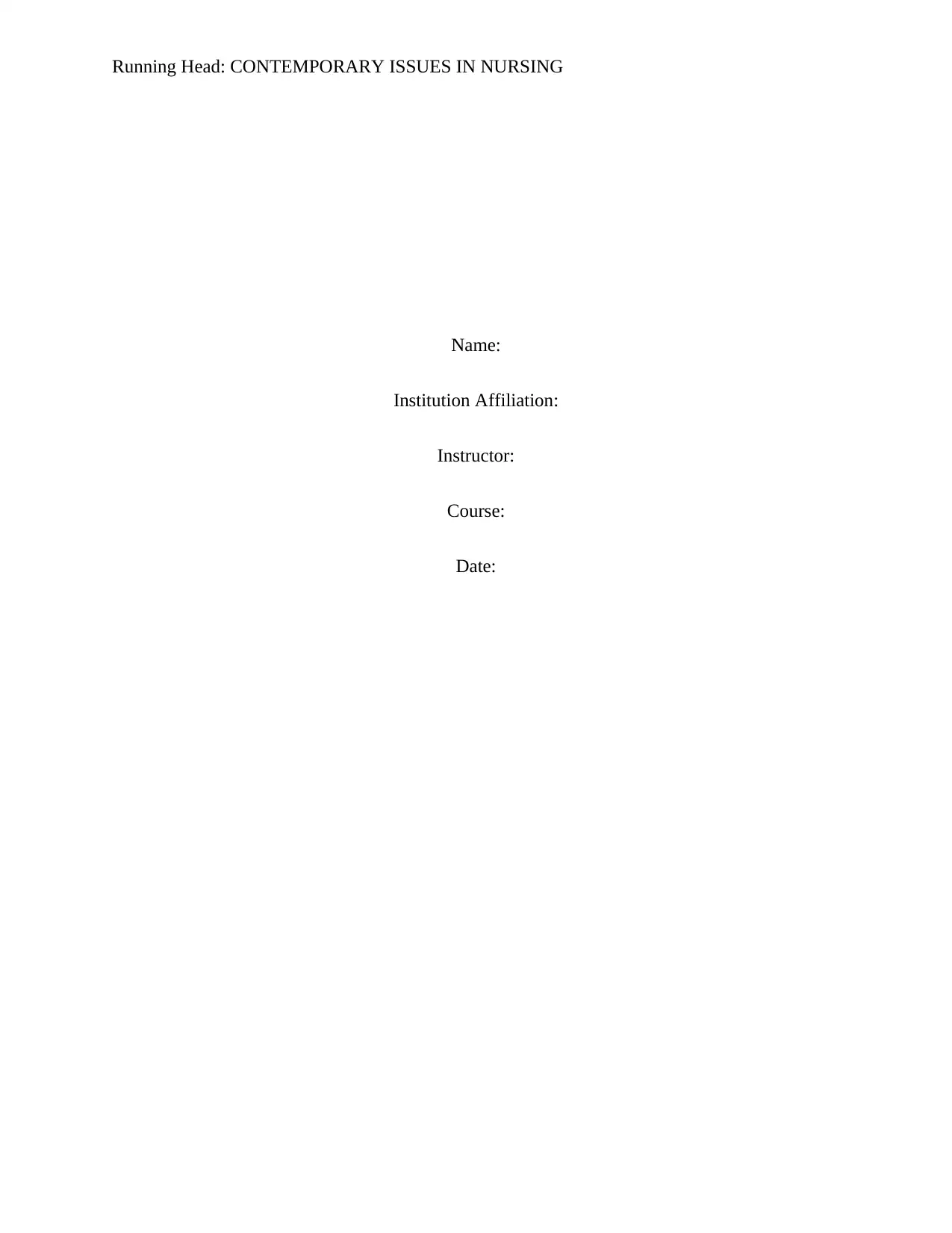
Running Head: CONTEMPORARY ISSUES IN NURSING
Name:
Institution Affiliation:
Instructor:
Course:
Date:
Name:
Institution Affiliation:
Instructor:
Course:
Date:
Paraphrase This Document
Need a fresh take? Get an instant paraphrase of this document with our AI Paraphraser
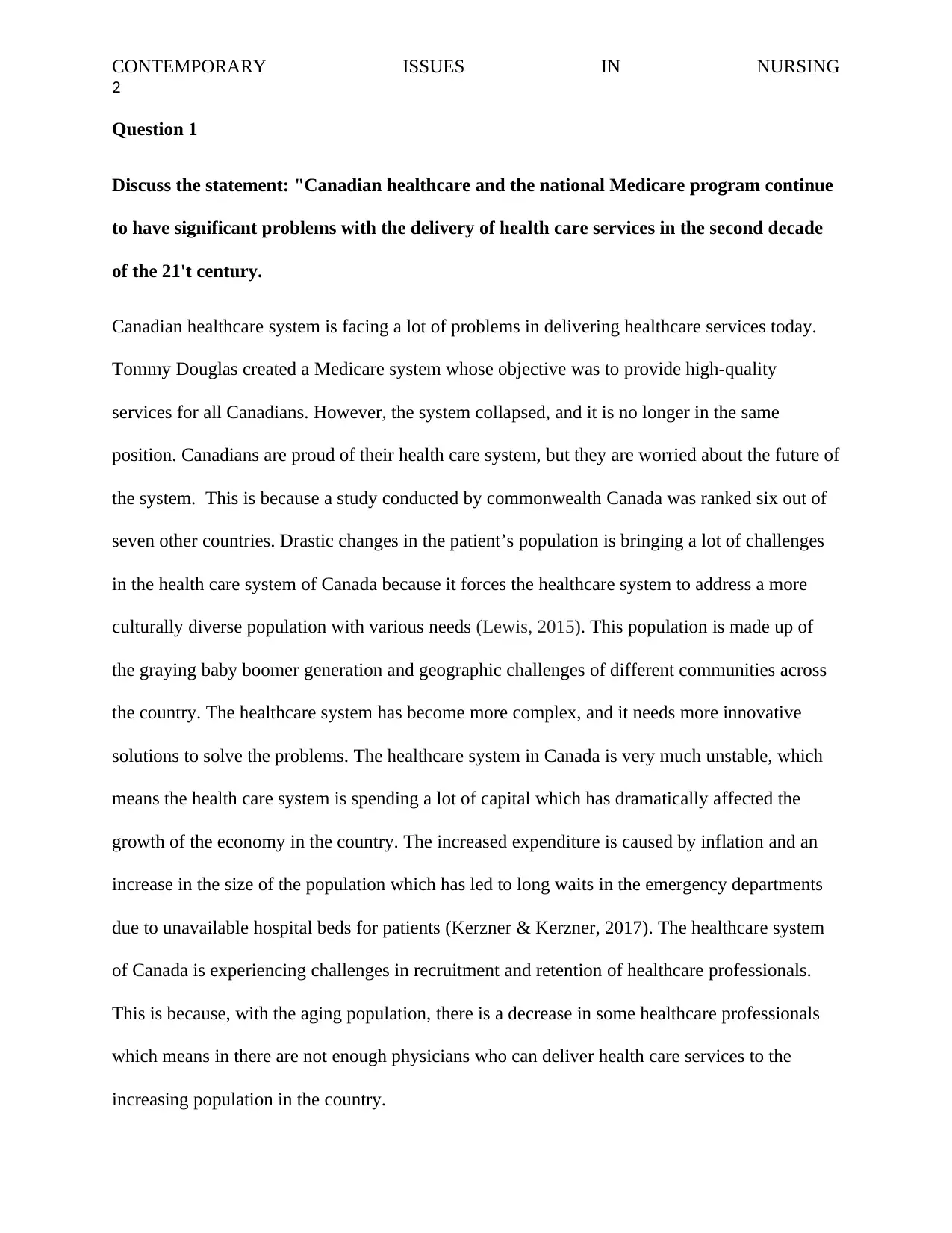
CONTEMPORARY ISSUES IN NURSING
2
Question 1
Discuss the statement: "Canadian healthcare and the national Medicare program continue
to have significant problems with the delivery of health care services in the second decade
of the 21't century.
Canadian healthcare system is facing a lot of problems in delivering healthcare services today.
Tommy Douglas created a Medicare system whose objective was to provide high-quality
services for all Canadians. However, the system collapsed, and it is no longer in the same
position. Canadians are proud of their health care system, but they are worried about the future of
the system. This is because a study conducted by commonwealth Canada was ranked six out of
seven other countries. Drastic changes in the patient’s population is bringing a lot of challenges
in the health care system of Canada because it forces the healthcare system to address a more
culturally diverse population with various needs (Lewis, 2015). This population is made up of
the graying baby boomer generation and geographic challenges of different communities across
the country. The healthcare system has become more complex, and it needs more innovative
solutions to solve the problems. The healthcare system in Canada is very much unstable, which
means the health care system is spending a lot of capital which has dramatically affected the
growth of the economy in the country. The increased expenditure is caused by inflation and an
increase in the size of the population which has led to long waits in the emergency departments
due to unavailable hospital beds for patients (Kerzner & Kerzner, 2017). The healthcare system
of Canada is experiencing challenges in recruitment and retention of healthcare professionals.
This is because, with the aging population, there is a decrease in some healthcare professionals
which means in there are not enough physicians who can deliver health care services to the
increasing population in the country.
2
Question 1
Discuss the statement: "Canadian healthcare and the national Medicare program continue
to have significant problems with the delivery of health care services in the second decade
of the 21't century.
Canadian healthcare system is facing a lot of problems in delivering healthcare services today.
Tommy Douglas created a Medicare system whose objective was to provide high-quality
services for all Canadians. However, the system collapsed, and it is no longer in the same
position. Canadians are proud of their health care system, but they are worried about the future of
the system. This is because a study conducted by commonwealth Canada was ranked six out of
seven other countries. Drastic changes in the patient’s population is bringing a lot of challenges
in the health care system of Canada because it forces the healthcare system to address a more
culturally diverse population with various needs (Lewis, 2015). This population is made up of
the graying baby boomer generation and geographic challenges of different communities across
the country. The healthcare system has become more complex, and it needs more innovative
solutions to solve the problems. The healthcare system in Canada is very much unstable, which
means the health care system is spending a lot of capital which has dramatically affected the
growth of the economy in the country. The increased expenditure is caused by inflation and an
increase in the size of the population which has led to long waits in the emergency departments
due to unavailable hospital beds for patients (Kerzner & Kerzner, 2017). The healthcare system
of Canada is experiencing challenges in recruitment and retention of healthcare professionals.
This is because, with the aging population, there is a decrease in some healthcare professionals
which means in there are not enough physicians who can deliver health care services to the
increasing population in the country.
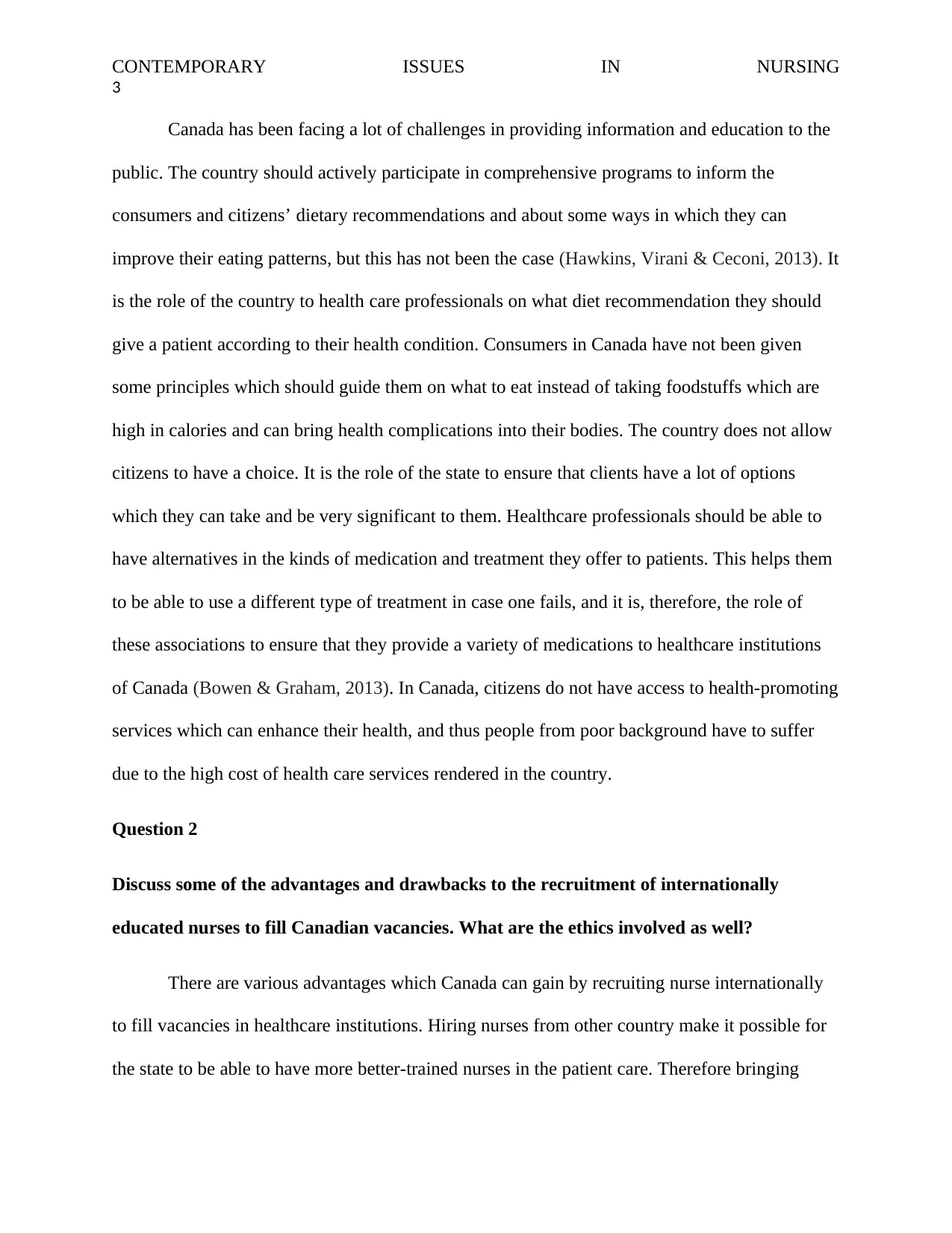
CONTEMPORARY ISSUES IN NURSING
3
Canada has been facing a lot of challenges in providing information and education to the
public. The country should actively participate in comprehensive programs to inform the
consumers and citizens’ dietary recommendations and about some ways in which they can
improve their eating patterns, but this has not been the case (Hawkins, Virani & Ceconi, 2013). It
is the role of the country to health care professionals on what diet recommendation they should
give a patient according to their health condition. Consumers in Canada have not been given
some principles which should guide them on what to eat instead of taking foodstuffs which are
high in calories and can bring health complications into their bodies. The country does not allow
citizens to have a choice. It is the role of the state to ensure that clients have a lot of options
which they can take and be very significant to them. Healthcare professionals should be able to
have alternatives in the kinds of medication and treatment they offer to patients. This helps them
to be able to use a different type of treatment in case one fails, and it is, therefore, the role of
these associations to ensure that they provide a variety of medications to healthcare institutions
of Canada (Bowen & Graham, 2013). In Canada, citizens do not have access to health-promoting
services which can enhance their health, and thus people from poor background have to suffer
due to the high cost of health care services rendered in the country.
Question 2
Discuss some of the advantages and drawbacks to the recruitment of internationally
educated nurses to fill Canadian vacancies. What are the ethics involved as well?
There are various advantages which Canada can gain by recruiting nurse internationally
to fill vacancies in healthcare institutions. Hiring nurses from other country make it possible for
the state to be able to have more better-trained nurses in the patient care. Therefore bringing
3
Canada has been facing a lot of challenges in providing information and education to the
public. The country should actively participate in comprehensive programs to inform the
consumers and citizens’ dietary recommendations and about some ways in which they can
improve their eating patterns, but this has not been the case (Hawkins, Virani & Ceconi, 2013). It
is the role of the country to health care professionals on what diet recommendation they should
give a patient according to their health condition. Consumers in Canada have not been given
some principles which should guide them on what to eat instead of taking foodstuffs which are
high in calories and can bring health complications into their bodies. The country does not allow
citizens to have a choice. It is the role of the state to ensure that clients have a lot of options
which they can take and be very significant to them. Healthcare professionals should be able to
have alternatives in the kinds of medication and treatment they offer to patients. This helps them
to be able to use a different type of treatment in case one fails, and it is, therefore, the role of
these associations to ensure that they provide a variety of medications to healthcare institutions
of Canada (Bowen & Graham, 2013). In Canada, citizens do not have access to health-promoting
services which can enhance their health, and thus people from poor background have to suffer
due to the high cost of health care services rendered in the country.
Question 2
Discuss some of the advantages and drawbacks to the recruitment of internationally
educated nurses to fill Canadian vacancies. What are the ethics involved as well?
There are various advantages which Canada can gain by recruiting nurse internationally
to fill vacancies in healthcare institutions. Hiring nurses from other country make it possible for
the state to be able to have more better-trained nurses in the patient care. Therefore bringing
⊘ This is a preview!⊘
Do you want full access?
Subscribe today to unlock all pages.

Trusted by 1+ million students worldwide
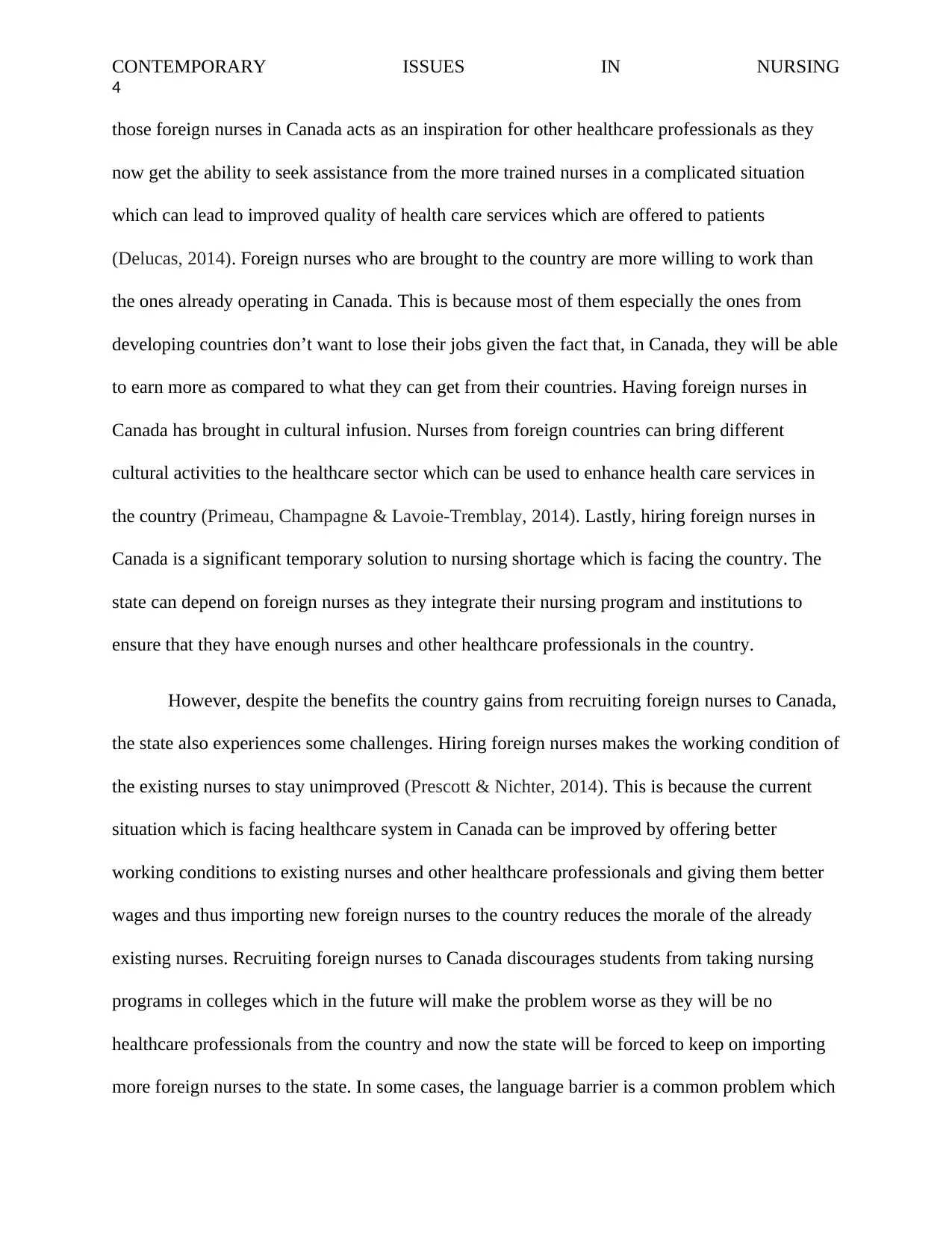
CONTEMPORARY ISSUES IN NURSING
4
those foreign nurses in Canada acts as an inspiration for other healthcare professionals as they
now get the ability to seek assistance from the more trained nurses in a complicated situation
which can lead to improved quality of health care services which are offered to patients
(Delucas, 2014). Foreign nurses who are brought to the country are more willing to work than
the ones already operating in Canada. This is because most of them especially the ones from
developing countries don’t want to lose their jobs given the fact that, in Canada, they will be able
to earn more as compared to what they can get from their countries. Having foreign nurses in
Canada has brought in cultural infusion. Nurses from foreign countries can bring different
cultural activities to the healthcare sector which can be used to enhance health care services in
the country (Primeau, Champagne & Lavoie-Tremblay, 2014). Lastly, hiring foreign nurses in
Canada is a significant temporary solution to nursing shortage which is facing the country. The
state can depend on foreign nurses as they integrate their nursing program and institutions to
ensure that they have enough nurses and other healthcare professionals in the country.
However, despite the benefits the country gains from recruiting foreign nurses to Canada,
the state also experiences some challenges. Hiring foreign nurses makes the working condition of
the existing nurses to stay unimproved (Prescott & Nichter, 2014). This is because the current
situation which is facing healthcare system in Canada can be improved by offering better
working conditions to existing nurses and other healthcare professionals and giving them better
wages and thus importing new foreign nurses to the country reduces the morale of the already
existing nurses. Recruiting foreign nurses to Canada discourages students from taking nursing
programs in colleges which in the future will make the problem worse as they will be no
healthcare professionals from the country and now the state will be forced to keep on importing
more foreign nurses to the state. In some cases, the language barrier is a common problem which
4
those foreign nurses in Canada acts as an inspiration for other healthcare professionals as they
now get the ability to seek assistance from the more trained nurses in a complicated situation
which can lead to improved quality of health care services which are offered to patients
(Delucas, 2014). Foreign nurses who are brought to the country are more willing to work than
the ones already operating in Canada. This is because most of them especially the ones from
developing countries don’t want to lose their jobs given the fact that, in Canada, they will be able
to earn more as compared to what they can get from their countries. Having foreign nurses in
Canada has brought in cultural infusion. Nurses from foreign countries can bring different
cultural activities to the healthcare sector which can be used to enhance health care services in
the country (Primeau, Champagne & Lavoie-Tremblay, 2014). Lastly, hiring foreign nurses in
Canada is a significant temporary solution to nursing shortage which is facing the country. The
state can depend on foreign nurses as they integrate their nursing program and institutions to
ensure that they have enough nurses and other healthcare professionals in the country.
However, despite the benefits the country gains from recruiting foreign nurses to Canada,
the state also experiences some challenges. Hiring foreign nurses makes the working condition of
the existing nurses to stay unimproved (Prescott & Nichter, 2014). This is because the current
situation which is facing healthcare system in Canada can be improved by offering better
working conditions to existing nurses and other healthcare professionals and giving them better
wages and thus importing new foreign nurses to the country reduces the morale of the already
existing nurses. Recruiting foreign nurses to Canada discourages students from taking nursing
programs in colleges which in the future will make the problem worse as they will be no
healthcare professionals from the country and now the state will be forced to keep on importing
more foreign nurses to the state. In some cases, the language barrier is a common problem which
Paraphrase This Document
Need a fresh take? Get an instant paraphrase of this document with our AI Paraphraser
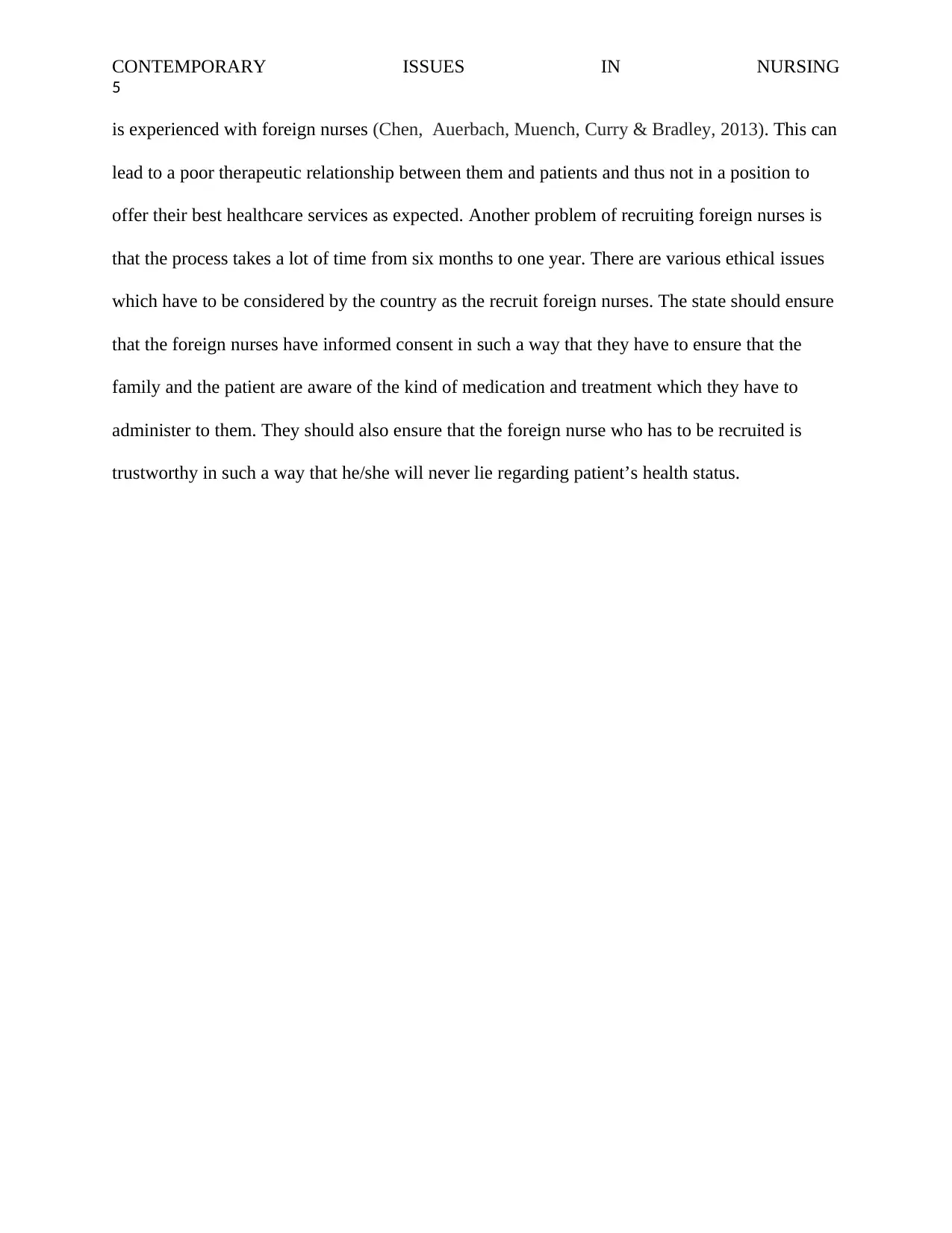
CONTEMPORARY ISSUES IN NURSING
5
is experienced with foreign nurses (Chen, Auerbach, Muench, Curry & Bradley, 2013). This can
lead to a poor therapeutic relationship between them and patients and thus not in a position to
offer their best healthcare services as expected. Another problem of recruiting foreign nurses is
that the process takes a lot of time from six months to one year. There are various ethical issues
which have to be considered by the country as the recruit foreign nurses. The state should ensure
that the foreign nurses have informed consent in such a way that they have to ensure that the
family and the patient are aware of the kind of medication and treatment which they have to
administer to them. They should also ensure that the foreign nurse who has to be recruited is
trustworthy in such a way that he/she will never lie regarding patient’s health status.
5
is experienced with foreign nurses (Chen, Auerbach, Muench, Curry & Bradley, 2013). This can
lead to a poor therapeutic relationship between them and patients and thus not in a position to
offer their best healthcare services as expected. Another problem of recruiting foreign nurses is
that the process takes a lot of time from six months to one year. There are various ethical issues
which have to be considered by the country as the recruit foreign nurses. The state should ensure
that the foreign nurses have informed consent in such a way that they have to ensure that the
family and the patient are aware of the kind of medication and treatment which they have to
administer to them. They should also ensure that the foreign nurse who has to be recruited is
trustworthy in such a way that he/she will never lie regarding patient’s health status.
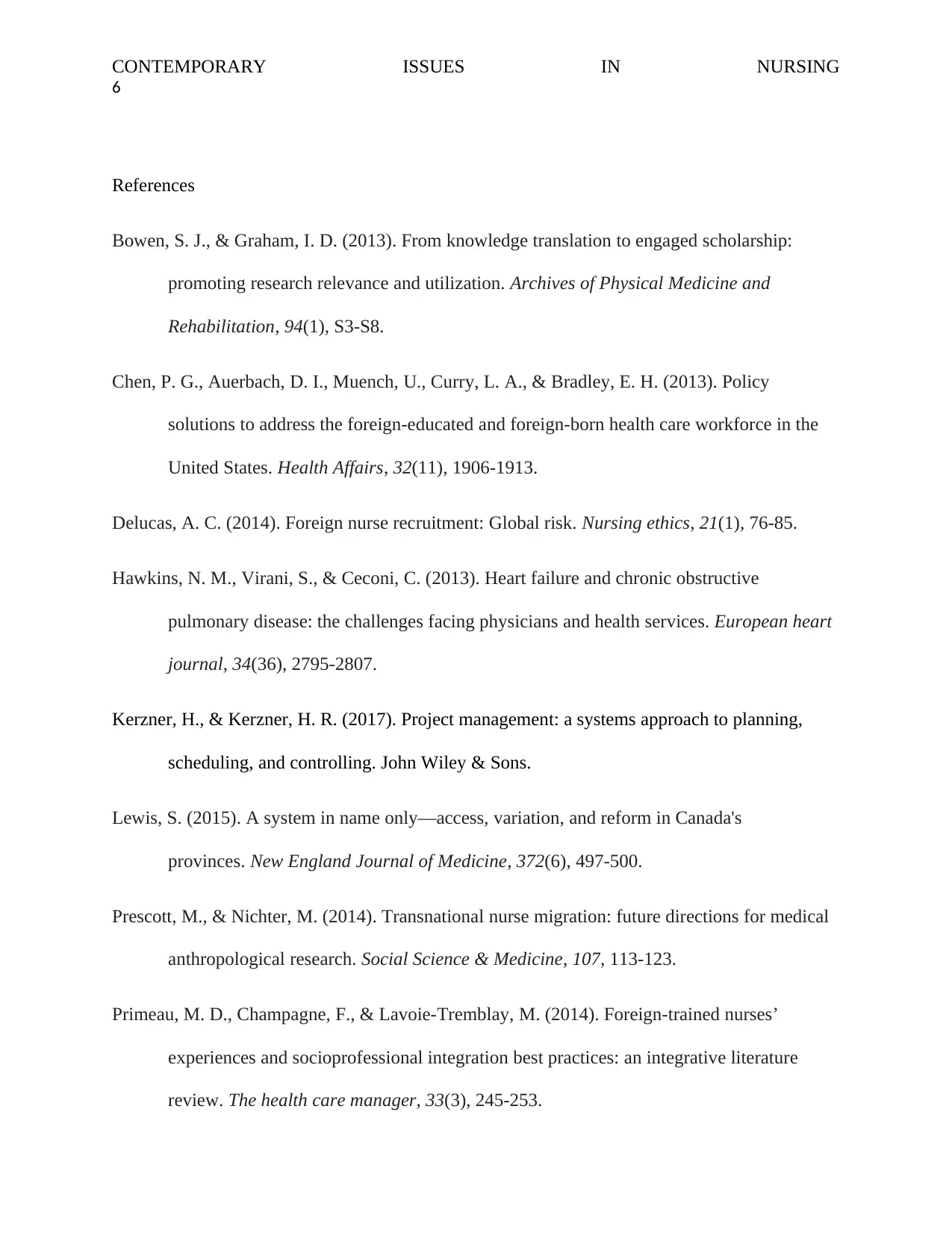
CONTEMPORARY ISSUES IN NURSING
6
References
Bowen, S. J., & Graham, I. D. (2013). From knowledge translation to engaged scholarship:
promoting research relevance and utilization. Archives of Physical Medicine and
Rehabilitation, 94(1), S3-S8.
Chen, P. G., Auerbach, D. I., Muench, U., Curry, L. A., & Bradley, E. H. (2013). Policy
solutions to address the foreign-educated and foreign-born health care workforce in the
United States. Health Affairs, 32(11), 1906-1913.
Delucas, A. C. (2014). Foreign nurse recruitment: Global risk. Nursing ethics, 21(1), 76-85.
Hawkins, N. M., Virani, S., & Ceconi, C. (2013). Heart failure and chronic obstructive
pulmonary disease: the challenges facing physicians and health services. European heart
journal, 34(36), 2795-2807.
Kerzner, H., & Kerzner, H. R. (2017). Project management: a systems approach to planning,
scheduling, and controlling. John Wiley & Sons.
Lewis, S. (2015). A system in name only—access, variation, and reform in Canada's
provinces. New England Journal of Medicine, 372(6), 497-500.
Prescott, M., & Nichter, M. (2014). Transnational nurse migration: future directions for medical
anthropological research. Social Science & Medicine, 107, 113-123.
Primeau, M. D., Champagne, F., & Lavoie-Tremblay, M. (2014). Foreign-trained nurses’
experiences and socioprofessional integration best practices: an integrative literature
review. The health care manager, 33(3), 245-253.
6
References
Bowen, S. J., & Graham, I. D. (2013). From knowledge translation to engaged scholarship:
promoting research relevance and utilization. Archives of Physical Medicine and
Rehabilitation, 94(1), S3-S8.
Chen, P. G., Auerbach, D. I., Muench, U., Curry, L. A., & Bradley, E. H. (2013). Policy
solutions to address the foreign-educated and foreign-born health care workforce in the
United States. Health Affairs, 32(11), 1906-1913.
Delucas, A. C. (2014). Foreign nurse recruitment: Global risk. Nursing ethics, 21(1), 76-85.
Hawkins, N. M., Virani, S., & Ceconi, C. (2013). Heart failure and chronic obstructive
pulmonary disease: the challenges facing physicians and health services. European heart
journal, 34(36), 2795-2807.
Kerzner, H., & Kerzner, H. R. (2017). Project management: a systems approach to planning,
scheduling, and controlling. John Wiley & Sons.
Lewis, S. (2015). A system in name only—access, variation, and reform in Canada's
provinces. New England Journal of Medicine, 372(6), 497-500.
Prescott, M., & Nichter, M. (2014). Transnational nurse migration: future directions for medical
anthropological research. Social Science & Medicine, 107, 113-123.
Primeau, M. D., Champagne, F., & Lavoie-Tremblay, M. (2014). Foreign-trained nurses’
experiences and socioprofessional integration best practices: an integrative literature
review. The health care manager, 33(3), 245-253.
⊘ This is a preview!⊘
Do you want full access?
Subscribe today to unlock all pages.

Trusted by 1+ million students worldwide
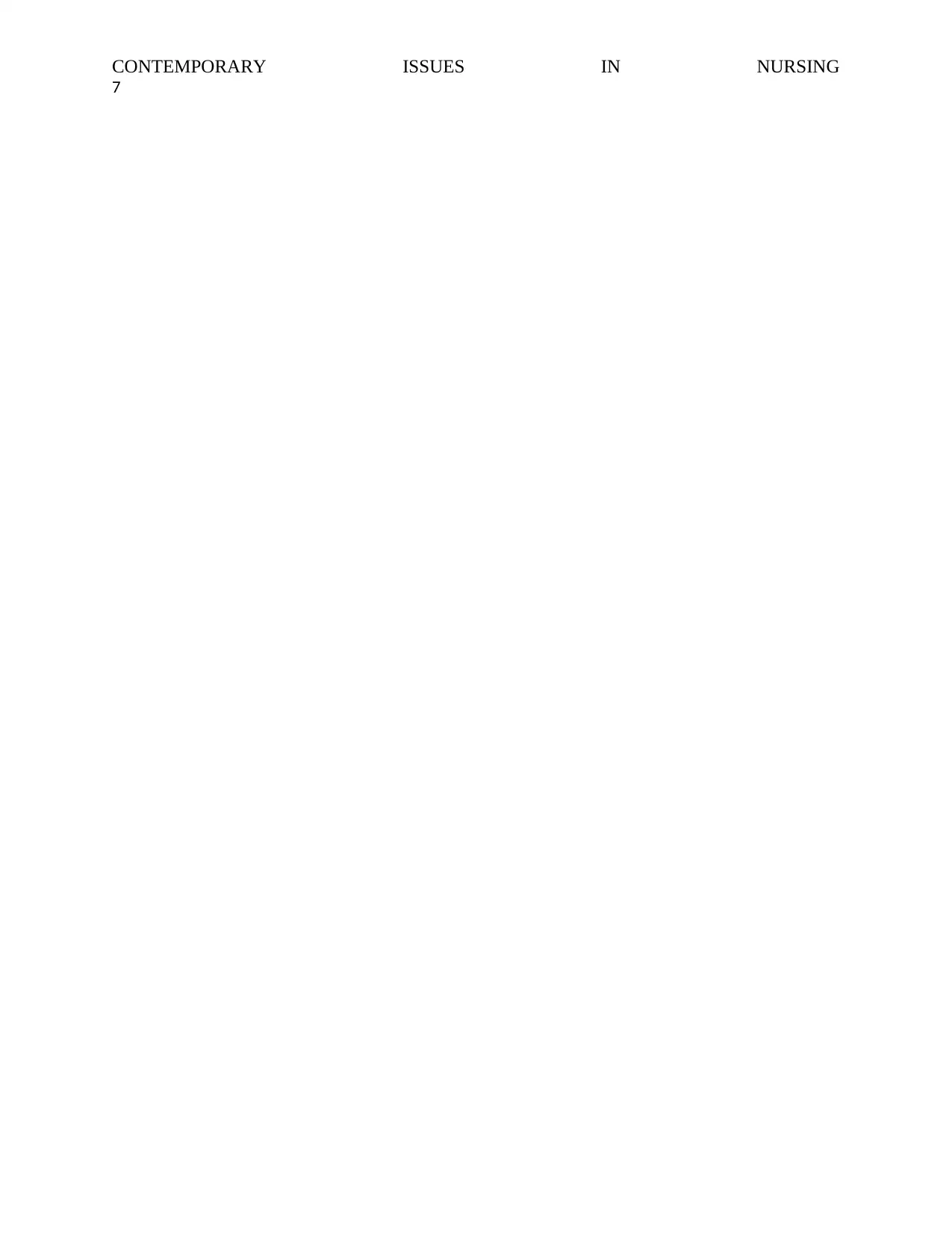
CONTEMPORARY ISSUES IN NURSING
7
7
1 out of 7
Related Documents
Your All-in-One AI-Powered Toolkit for Academic Success.
+13062052269
info@desklib.com
Available 24*7 on WhatsApp / Email
![[object Object]](/_next/static/media/star-bottom.7253800d.svg)
Unlock your academic potential
Copyright © 2020–2025 A2Z Services. All Rights Reserved. Developed and managed by ZUCOL.





